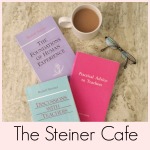Steiner chooses the topic of “cosmic law” for his morning lecture on Day Three of the very first Waldorf teacher training in August of 1919. He says, “As modern teachers, we must hold a comprehensive view of cosmic law.”
What does he mean by cosmic law? He explains that the world is both continuously dying and becoming at the same time. And we want to embody an understanding of this in our teaching.
In this lecture, Steiner juxtaposes the natural world with the spiritual world. “As human begins, we have a relationship with the natural world on the one hand, and the spiritual world on the other.” And this familiarity with nature and the spiritual life allows human beings to become part of a social life, and to play a unique role.
Steiner describes nature as a place of the will where perceptions are a result of the senses. From my vantage point, he seems to be saying that exploring nature is the ultimate in experiential learning! Thus the importance of experiences in nature. As an explanation, Steiner asserts that the activity of picking up a piece of chalk is similar to the spiritual process that occurs when we really “see” something.
Steiner: “In nature, dying and becoming are continuously interwoven.” And the comprehension of this “through the intellect of what is dead and through the will of what is living” is something unique to the human being.
In this lecture, Steiner goes into detail about how the earth would not continue to exist without human beings. “It is human beings, who, through their bodies provide leaven similar to yeast for the Earth’s further development.” We have the capability to transform both the physical and spiritual during our lifetimes, and this is something no other living thing can do in Steiner’s view. “The matter and also the forces the human being receives at birth are renewed during life and returned to the earth transformed.”
So, it’s not just that we are born and later die, but that because of our souls and spiritual connection, what we started with is transformed. I have always found it intriguing that Steiner never attached his spiritual views to a particular religion or dogma. And in this lecture to teachers, he wants us to grasp the importance of experiencing through the senses both the world of nature and the spiritual world, and to understand this idea of the unique ability of human beings to transform.
A higher calling to be sure, this art of teaching!
The Steiner Cafe is a place to explore and reflect on the lectures that Rudolf Steiner gave at the Teacher’s Seminar in 1919, the very first Waldorf teacher training. Each month here, we ponder one day of the seminar.
To read reflections on previous lectures, check out The Steiner Cafe page.
These lectures are published in three books; the morning lectures in The Foundations of Human Experience; later morning lectures in Practical Advice to Teachers; and afternoon lectures in Discussions with Teachers. We invite you to pick up the books and read along.
If you prefer, you can read online at www.rsarchive.org, or listen at www.rudolfsteineraudio.com. Or, just meet us here each Thursday or Friday at The Steiner Cafe for some lively discussion. Lot’s of options! Hope you’ll join us.


